Suicide is only the solution when we are talking about Suicide Commando, the legendary Belgian act that started making abrasive industrial music. Their style changed along the years to end up with the harsh electro sound that made them famous. We have chatted with Johan Van Roy about the story of a band that will be one of the main acts of the Darkmad festival that is going to take place in Madrid, on the 15th and 16th of October.
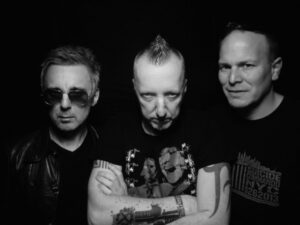 —How was the Belgium that saw the birth of Suicide Commando? Nowadays, each documental tries to explain music according to the sociopolitical aspects of the time. Do you find any relation between your beginnings and the situation in your country?
—How was the Belgium that saw the birth of Suicide Commando? Nowadays, each documental tries to explain music according to the sociopolitical aspects of the time. Do you find any relation between your beginnings and the situation in your country?
—I’m sure the eighties had their impact on me and my music. I grew up in the eighties with the new wave movement (with bands like The Cure, Sisters of Mercy, Joy Division… and later with bands like Front 242, The Neon Judgement, Klinik…), which was highly influenced by the political crisis in those years with high unemployment…
Even though it wasn’t the main reason why I started making music, the dark and negative atmosphere of the eighties surely had their influence in my music.
—Your first self-titled cassettes were pure industrial. What were your influences back then? What did you want to achieve with the project at the time?
—Musically my biggest influence for sure was the music from Klinik. When I discovered bands like Klinik, Front 242, Fad Gadget… I really wanted to start an electronic project, and so Suicide Commando was born.
I didn’t have any goals when I started making music, for me my music all had to do with passion, passion for electronic music. And even today my passion for this kind of music is my biggest motivation.
—Do you think that the industrial scene changed from the end of the seventies to the end of the eighties? I mean that after ten years it was still mainly cassette-based and very underground.
—I don’t think the industrial scene changed that much in those early years.
Indeed everything was still very underground and many bands just started with releasing tapes, even bands like Front Line Assembly, Nitzer Ebb… all started this way.
The main difference for sure were the technical limitations. Synths still were extremely expensive in those years, samplers were even more expensive and very limited in possibilities. Tapes and vinyl were still common.
The real technological revolution started in the early nineties with the arrival of computers and the rise of the compact disc…
—Can you tell me how was the music of your albums Crap and Go to hell? I could not find them. Any plan of a reissue of all this material?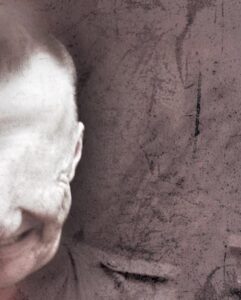
—Both Crap and Go to hell were in the same line as my other early tapes, very experimental, minimal and industrial.
Over the years I’ve been getting many requests for doing reissues of my old demo tapes, so far we did reissue the last 2 demo tapes Black Flowers and Electro Convulsion Therapy, and right now there are plans for reissuing the very first demo tape from 1988 on vinyl.
—You recorded two albums with the band Stin Scatzor (each of you taking a side of the record) at the beginnings of the nineties. How was this collaboration born?
—End of the eighties I met Stefan Bens who just started his own project with Stin Scatzor, not much later we started an EBM project together called Lescure 13, and we indeed did these 2 split tapes together. I think it was a nice way to spread our music and with buying 1 tape you could discover 2 bands. It was an interesting way to reach more people.
—How did you get into a more electro sound? Was Into the Grave the first seed of the future sound of Suicide Commando?
—It wasn’t a deliberate choice, but with extending my equipment bit by bit, I also got more possibilities music-wise, so I think it was more of a natural evolution of my sound. New equipment meant more possibilities.
Maybe Into the Grave was the first tape with a more electro sound, but it wasn’t intentional.
—What gear were you using during the first years of Suicide Commando? The recordings were done at home, right?
—My first gear were the now legendary Roland SH101 synth, connected with a Boss Dr. Rhythm drum machine. That was basically it in the beginning. Slowly I started extending my gear with more drum machines and synths. It took me till 1995 and my 2nd CD album Stored Images to start working on a computer, with the now also legendary Atari 1040ST.
All my recordings were done at home, my very first tape with a rented 4-track recorder from a friend. But even today I still do all my recordings at home, of course, with way more possibilities than in those early years.
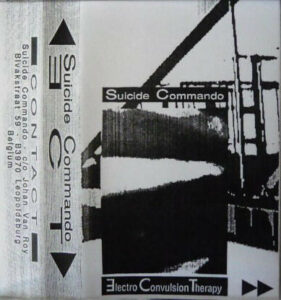 —E.C.T. (Electro Convulsion Therapy) was your last self-released album. How did things change between this album and the following? I mean, a label started releasing your music… You used some of the songs from the release again in Critical Stage, why?
—E.C.T. (Electro Convulsion Therapy) was your last self-released album. How did things change between this album and the following? I mean, a label started releasing your music… You used some of the songs from the release again in Critical Stage, why?
—Soon after the release of the E.C.T. tape I got the possibility to appear on some sort of split CD with 3 other rising bands. The CD was called Induktion, Varianz und Deren Folgen on Kugelblitz Records and the guy behind this small German label was Stefan Herwig. He soon after started to work for a way bigger German label called Off Beat, so I kind of joined him to this label.
In a way you can consider Critical Stage as some sort of “best of” of my early years. It indeed had quite some songs from my last E.C.T. demo tape, but also some older reworked versions.
—In Critical Stage you worked with Eric van Wonterghem and Dirk Ivens, how was working with them? You said before that they were a big influence on your work. One of the songs of this album has been released again by Dirk Ivens in his new Dive album. Do you like the new version?
—Well, Belgium is very small, so it was pretty easy to get in touch with them. 😀
Eric was just running a mastering studio, so for me it was the perfect studio to master my first albums.
Like I said, I adored Klinik, so for sure they were a big influence for my music, and even today they still can be considered as one of the main influences.
Yes, I heard Dirk’s new version. I’m not even sure Dirk still remembered he used those lyrics on my first album 😀
It’s one of those typical experimental and minimal Dive songs, maybe not my favorite, but still typical Dive.
—Some people complained of the use of samples in Mindstrip. Years later, what do you think about it? It’s true that now-a-days, dark electro bands use a lot of samples in their songs.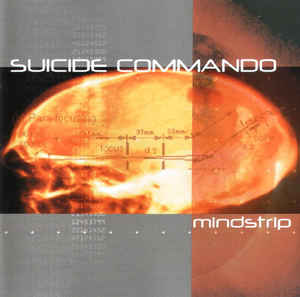
—I still love using samples, it can create a certain atmosphere which fits really well with the kind of music I’m doing.
It’s true that I used a lot of samples on the Mindstrip album, but I only discovered that when I was working on the Mindstrip Redux album, re-working all the songs from the original Mindstrip album. So it certainly wasn’t a deliberate choice to use so many samples. I also tried to use less samples on the Redux version, hopefully for the good.
—Thanks to the music of this period, you are considered one of the pioneers of the subgenre Aggrotech. What do you think of this style? Are you interested in any artist?
—What’s in a name? Aggrotech, Hellektro, Endzeit electro …all different names for the same music, in my opinion.
I don’t really see myself as the “inventor” of this kind of electronic music, bands like Leaether Strip … were already doing music in the same direction before me. But it’s true that the sudden success of the Mindstrip album back in 2000 started a boom in this kind of music, with many bands jumping on this Aggrotech train in the years after.
At first I really liked most bands jumping on this train, but after a while too many bands were all sounding the same and you got more quantity than quality, which I think was a pity as it led to some kind of overkill/overdose of this kind of music.
The funny thing is that at first I got praised for somehow being the “inventor” or “godfather” of Hellektro, Endzeit Electro … after the overdose I all of a sudden got blamed for all those copycats trying to sound like Suicide Commando. 😀
—In Axis of Evil, there are some references to Bush, in fact, the name of the album comes from an expression coined by him. Do you think that you can make people think with music? Are we going to have references to the current situation in future songs?
—I’m fully aware that my music or my lyrics won’t change the world, but I’m already satisfied if my music at least make people think about some issues for a moment.
I’m not a political band at all, but over the years I wrote more songs about political issues that I personally don’t agree with, songs like “In Guns We Trust” (about the gun policy in the USA) or more recently “Bunkerb!tch” (about political oppression) …for example.
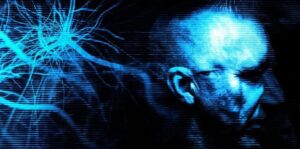 —Bind Torture Kill was a concept album about serial killers, the title coming from the alias of Dennis Rader. What do you find interesting in them? Curiously when I was getting the questions ready, I found out that the serial killers who killed more people are from Peru and Ecuador, although sometimes we have a false idea of this being a USA thing.
—Bind Torture Kill was a concept album about serial killers, the title coming from the alias of Dennis Rader. What do you find interesting in them? Curiously when I was getting the questions ready, I found out that the serial killers who killed more people are from Peru and Ecuador, although sometimes we have a false idea of this being a USA thing.
—I’ve always had some kind of fascination for serial killers, not necessarily for their cruel actions in itself, but more some kind of fascination for the psychological aspect of it all, like what goes on in their mind when they commit such morbid and cruel actions, or what they were thinking when they committed their crimes, if it brought them any (sexual) satisfaction…
Oh I’m sure there are many more serial killers out there, I don’t think it can be downsized to just the USA or Europe … they are everywhere! 🙂
—There are always a lot of remixes in your EPs, how do you choose an artist to remix you? Any special one you like?
—Often it’s more of a remix exchange with bands or smaller bands asking me whether they can do a remix for me, or me just asking befriended bands to do a remix for me.
I’d rather have some smaller bands doing remixes for me with passion and devotion, rather than bigger bands asking for money and delivering uninspired remixes.
—You are also a DJ, when is the best time to play a Suicide Commando track during one of your sessions?
—When you want the people to go home… 😀
Haha no seriously, I don’t really like to spin my own songs in my DJ sets, don’t ask me why… I also don’t consider myself as a real DJ, I have absolutely no DJ-ing skills.
—You were one of the founders of Dependent Records with Eskil Simonsson (Covenant), Bryan Erickson (Velvet Acid Christ), Ronan Harris (VNV Nation) and Stefan Herwig. How was running a label with such an incredible group of musicians?
—We were not actually “running” the label, that job was for Stefan Herwig only, you could more see us as a signboard or platform for the label, to make it more recognisable for the outer world.
—Your last release has been Mindstrip Redux. Why do you think that these songs needed an update/new versions?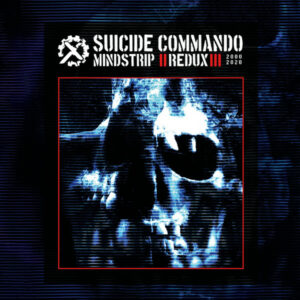
—At first I only reworked the“Hellraiser” song, but somehow it was so much fun reworking that song, that I also started reworking the “Mindstripper” song … and so the idea came to my mind to rework all the songs from that album. The Mindstrip album was exactly 20 years old in 2020, so I thought it could be a cool idea to do a complete make over of that album, also because I was not completely satisfied with the sound quality and recordings of the original version. Did you know that the original Mindstrip even was recorded mono? Mindstrip meant a real mile stone in my career, so I thought it deserved a new re-release.
—One of your longest-life project was Lescure 13 as you previously commented, what can you please tell us about it? When did you meet Stefan? Maybe when you recorded the albums with Stin Scatzor?
—Actually, that’s a funny story, I met Stefan after placing an ad in a magazine where I was searching for like-minded people who were interested in listening and making electronic music. And so we met, I still remember Stefan stepping out of the train in Leopoldsburg (my home town) with his synth under his arm. 😀
Not much later Lescure 13 was born. With Lescure 13 we wanted to do some more EBM oriented songs, influenced by our mutual love for bands like Nitzer Ebb…
When Suicide Commando became bigger and bigger, I unfortunately got less and less time to work and concentrate on Lescure 13, but we never really stopped. We still do concerts from time to time with Lescure 13, and if we find the time we still hope to work on some new material, but today we more see Lescure 13 as our fun project. There are no rules inside Lescure 13, we do whatever we want and whenever we want…
—What happened with your project Kombat Unit? You released only one track, right?
—Officially we released 2 songs on different compilations, and we had a few more songs in the pipeline, but a bit like with Lescure 13, I simply did not have enough time to combine all these projects, so I had to make choices. Suicide Commando is taking so much of my free time, so there’s hardly any time left for other things.
But same as with Lescure 13, we never really stopped, so who knows we’ll work on some more songs sometime…
—How have you lived the pandemic so far? You managed to play a few concerts, right? How was the experience? I guess it must be kind of weird especially with the style of music that you play.
—It’s been hard, and we’re still in it… It hasn’t been easy, but I guess it has been a hard year for everyone. And after all I’m lucky I still can make music in my home studio, so I’m trying to stay sane.
Yes, we were lucky to be able to do 4 shows in Germany in September last year. It was great being on stage again, but indeed it was pretty weird because of the corona restrictions. Depending on where in Germany we played, we had different restrictions, so a few shows were still close to normal conditions, but the weirdest show probably was our show in Frankfurt where we had to play in the afternoon and the audience was not allowed to stand in front of the stage, they all had to sit at table. Now that was pretty weird, but also funny at the same time. It more felt as if we were playing at some bingo evening for elderly people. But nonetheless we were grateful we at least could do these few shows.
—The last album of original material is from 2017, are you working on anything new?
—Yes, I’m currently working on new material for a new album which I hope to finish somewhere end of the year. And in between I also released some new songs on the Dein Herz, Meine Gier / Bunkerb!tch EP. It was released shortly before the Mindstrip Redux album.
—What can we expect of your concert at Darkmad?
—Our hunger for new shows is so big at the moment, so expect an extra motivated band on stage. If I get the new songs finished in time, we probably will present some new material and bring a totally new show.
It will be so great to be on stage again, so great to finally play in Spain again, so great to hook up with all those other great artists and meet our fans again.
I’m so much looking forward to this one!
So fingers crossed we’ll meet in October!!!




